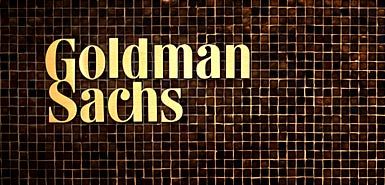
THE SUNDAY TIMES: Number 85 Broad Street, a dull, rust-coloured office block in lower Manhattan, doesn’t look like a place to stop and stare, and that’s just the way the people who work there like it. The men and women who arrive in the watery dawn sunshine, dressed in Wall Street black, clutching black briefcases and BlackBerrys, are very, very private. They walk quickly from their black Lincoln town cars to the lobby, past, well, nothing, really. There’s no name plate on the building, no sign on the front desk and the armed policeman stationed outside isn’t saying who works there. There’s a good reason for the secrecy. Number 85 Broad Street, New York, NY 10004, is where the money is. All of it.
 It’s the site of the best cash-making machine that global capitalism has ever produced, and, some say, a political force more powerful than governments. The people who work behind the brass-trim glass doors make more money than some countries do. They are the rainmakers’ rainmakers, the biggest swinging dicks in the financial jungle. Their assets total $1 trillion, their annual revenues run into the tens of billions, and their profits are in the billions, which they distribute liberally among themselves. Average pay this recessionary year for the 30,000 staff is expected to be a record $700,000. Top earners will get tens of millions, several hundred thousand times more than a cleaner at the firm. When they have finished getting "filthy rich by 40", as the company saying goes, these alpha dogs don’t put their feet up. They parachute into some of the most senior political posts in the US and beyond, prompting accusations that they "rule the world". Number 85 Broad Street is the home of Goldman Sachs.
It’s the site of the best cash-making machine that global capitalism has ever produced, and, some say, a political force more powerful than governments. The people who work behind the brass-trim glass doors make more money than some countries do. They are the rainmakers’ rainmakers, the biggest swinging dicks in the financial jungle. Their assets total $1 trillion, their annual revenues run into the tens of billions, and their profits are in the billions, which they distribute liberally among themselves. Average pay this recessionary year for the 30,000 staff is expected to be a record $700,000. Top earners will get tens of millions, several hundred thousand times more than a cleaner at the firm. When they have finished getting "filthy rich by 40", as the company saying goes, these alpha dogs don’t put their feet up. They parachute into some of the most senior political posts in the US and beyond, prompting accusations that they "rule the world". Number 85 Broad Street is the home of Goldman Sachs.The world’s most successful investment bank likes to hide behind the tidal wave of money that it generates and sends crashing over Manhattan, the City of London and most of the world’s other financial capitals. But now the dark knights of banking are being forced, blinking, into the cold light of day. The public, politicians and the press blame bankers’ reckless trading for the credit crunch and, as the most successful bank still standing, Goldman is their prime target. Here, politicians and commentators compete to denounce Goldman in ever more robust terms — "robber barons", "economic vandals", "vulture capitalists". Vince Cable, the Lib Dem Treasury spokesman, contrasts the bank’s recent record results — profits of $3.2 billion in the last quarter alone — and its planned bumper bonus payments with what has happened to ordinary people’s jobs and incomes in 2009.
It’s even worse in the US. There, Rolling Stone magazine ran a story that described Goldman as "a great vampire squid wrapped around the face of humanity, relentlessly jamming its blood funnel into anything that smells like money". In his latest documentary, Capitalism: A Love Story, Michael Moore drives up to 85 Broad Street in an armoured Brinks money van, leaps out carrying a sack with a giant dollar sign on it, looks up at the building and yells: "We’re here to get the money back for the American people!"
Goldman’s reputation is suddenly as toxic as the credit default swaps and other inexplicably exotic financial instruments it used to buy with glee. That’s bad for the one thing it values more than anything else: business. Being the prime target for popular and political outrage could put Goldman first in line for draconian new regulation. So it has, reluctantly, decided that the time has come to speak out, to fight its corner. That’s how, on one of those bright autumnal New York mornings when anything seems possible — even an invitation to break bread with the masters of the universe — I find myself walking past the security guard who held up Michael Moore and into the building with no name. I'm doing 'God's work'. Meet Mr Goldman Sachs >>> John Arlidge | Sunday, November 08, 2009